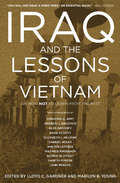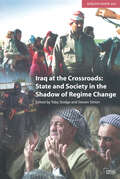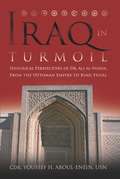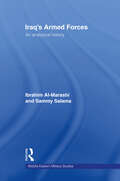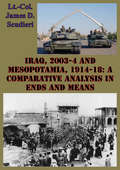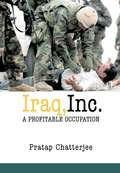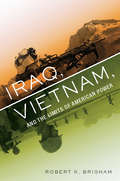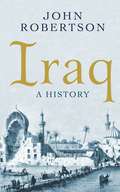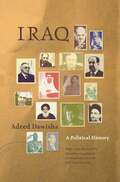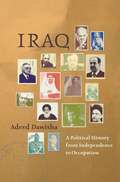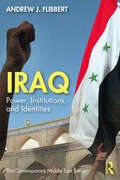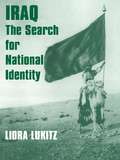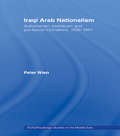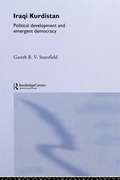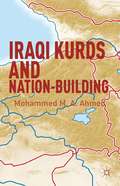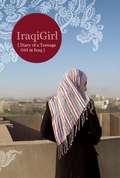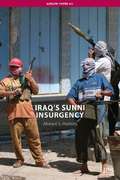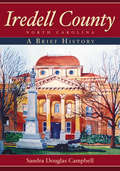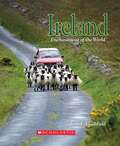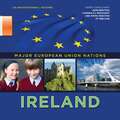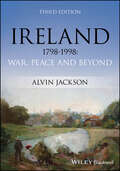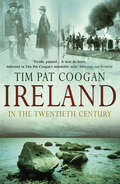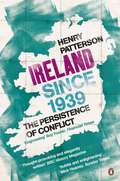- Table View
- List View
Iraq and the Lessons of Vietnam: Or, How Not to Learn from the Past
by John Prados Andrew J. Bacevich Christian G. Appy David Elliott Gabriel Kolko Alex Danchev Wilfried Mausbach Walter LaFeber Alfred W. McCoy Gareth Porter Elizabeth L. HillmanEssays by Christian G. Appy, Andrew J. Bacevich, John Prados, and others offer &“history at its best, meaning, at its most useful.&” —Howard Zinn From the launch of the &“Shock and Awe&” invasion in March 2003 through President George W. Bush&’s declaration of &“Mission Accomplished&” two months later, the war in Iraq was meant to demonstrate definitively that the United States had learned the lessons of Vietnam. This new book makes clear that something closer to the opposite is true—that US foreign policy makers have learned little from the past, even as they have been obsessed with the &“Vietnam Syndrome.&” Iraq and the Lessons of Vietnam brings together the country&’s leading historians of the Vietnam experience. Examining the profound changes that have occurred in the country and the military since the Vietnam War, this book assembles a distinguished group to consider how America found itself once again in the midst of a quagmire—and the continuing debate about the purpose and exercise of American power. Also includes contributions from: Alex Danchev * David Elliott * Elizabeth L. Hillman * Gabriel Kolko * Walter LaFeber * Wilfried Mausbach * Alfred W. McCoy * Gareth Porter &“Essential.&” —Bill Moyers
Iraq at the Crossroads: State and Society in the Shadow of Regime Change (Adelphi series #354)
by Steven Simon Toby DodgeA war against Iraq will spur radical changes in the way the country is governed, how its people live, and its relationship to its neighbours and to the West. This book depicts the evolution of Iraq under Saddam Hussein, and describes each side's battle plan and the war's likely aftermath.
Iraq in Turmoil
by Youssef H., Aboul-EneinThis is a unique collection of essays highlighting Iraq's social, political and military history from a purely Iraqi perspective. Dr. Ali al-Wardi (1913-1995) attended the American University of Beirut in 1943 and then traveled to the United States to attain his Masters and Doctorate degrees in Sociology at the University of Texas in 1948 and 1950 respectively. He would return to Iraq and spend a career teaching, however his main legacy is a multi-volume work in Arabic that began to be published in late 1951 and ended in the early 1970s with his eighth book. It is a two decade work that highlights the history of Iraq from the arrival of the Ottomans to the monarchy of King Feisal I in 1925. Wardi's volumes are read by a wide variety of Iraqi society, and this volume is an introduction to this pivotal Arabic work to English readers. It brings alive how the Ottomans, British and Safavid Persians dealt with sectarianism in Iraq and the battles fought over key areas of Iraq. It is required reading for those with an interest in or who are deploying to Iraq. Wardi's work also discusses the dynamics of the 1920 Revolt, a year long insurgency against the British that was only satisified when London engineered a political solution to its advantage. That solution became the imposition of a monarchy under King Feisal of Iraq, who was not Iraqi. The monarchy would topple in 1958 and see the rise of Baathism.
Iraq in Wartime
by Dina Rizk KhouryWhen US-led forces invaded Iraq in 2003, they occupied a country that had been at war for 23 years. Yet in their attempts to understand Iraqi society and history, few policy makers, analysts and journalists took into account the profound impact that Iraq's long engagement with war had on the Iraqis' everyday engagement with politics, the business of managing their daily lives, and their cultural imagination. Drawing on government documents and interviews, Dina Rizk Khoury traces the political, social and cultural processes of the normalization of war in Iraq during the last twenty-three years of Ba'thist rule. Khoury argues that war was a form of everyday bureaucratic governance and examines the Iraqi government's policies of creating consent, managing resistance and religious diversity, and shaping public culture. Coming on the tenth anniversary of the US-led invasion of Iraq, this book tells a multilayered story of a society in which war has become the norm.
Iraq's Armed Forces: An Analytical History (Middle Eastern Military Studies)
by Ibrahim Al-Marashi Sammy SalamaThis book provides the first comprehensive study of the evolution of the Iraqi military from the British mandate era to post-Baathist Iraq. Ethnic and sectarian turmoil is endemic to Iraq, and its armed forces have been intertwined with its political affairs since their creation. This study illustrates how the relationship between the military and
Iraq, 2003-4 And Mesopotamia, 1914-18: A Comparative Analysis In Ends And Means
by Lieutenant Colonel James D. ScudieriThis paper is a comparative analysis of the British campaign in Mesopotamia during the First World War, 1914-18 and the current campaign in Iraq, 2003-4. The study focuses on an examination of Phase III decisive operations and Phase IV reconstruction operations, including strategic imperatives, operational planning, and the impact of changes during operations. The British had no campaign plan for Mesopotamia upon the outbreak of war in 1914. Deployment to this theater began as a peripheral operation. Overriding politico-strategic requirements spurred further exploitation to reach Baghdad. Failure to match ends and means resulted in the disastrous surrender of a division at Kut on 29 April 1916. Sweeping reorganization and large-scale reinforcements resumed the advance; Baghdad fell on 11 March 1917. The British conducted ad-hoc reconstruction operations throughout this period, beginning in the Basra vilayet and expanding their scope with the capture of Baghdad. The British established viable civil institutions, to include police forces, a functioning legal system, Revenue and Customs Departments, a banking system, and even domestic mail.Conversely, the recent U.S. strategy of pre-emption in Iraq was a policy decision based upon the wider strategic perspective and benefited from exhaustive operational planning. However, the rolling start campaign utilized minimal forces. They had the capability to win the decisive operations phase rapidly, but this same troop level was woefully inadequate to conduct incompletely-planned, sorely under-estimated, post-conflict operations. Both campaigns suffered from a serious mismatch of ends and means at certain stages, especially for post-war reconstruction operations. They achieved significant success due to herculean efforts in theater. The study concludes with recommendations for strategic leaders related to planning and force structure.
Iraq, Inc.: A Profitable Occupation (Open Media Series)
by Pratap ChatterjeeMore than one year after the "fall of Baghdad," the reconstruction of Iraq was failing terribly. Ordinary Iraqis waited in line for basic necessities like clean water and fuel, while the number of civilians and soldiers killed escalated in tandem with the billions of U.S. tax dollars spent. In Iraq, Inc.: A Profitable Occupation, Pratap Chatterjee delivers an on-the-ground account of the occupation business, exposing private contractors as the only winners in this war.Chatterjee examines the big failings and even bigger swindles of Iraq's corporate managers, from the dangerous follies of an out-of-touch government-in-exile to the unchecked price gouging by Cheney's successors at Halliburton. In Iraq, Inc. Chatterjee contrasts the employment boom of mercenaries--more than 20,000 soldiers of fortune from apartheid-era South Africa, Pinochet's Chile, and elsewhere in Iraq--with the crowds of unemployed locals ripe for recruitment to the resistance.Drawing on years of research and first-hand experience in the region including his live reporting from post-invasion Iraq as he traveled around the country first in December 2003 when Saddam Hussein was captured and in April 2004 during the height of the siege of Fallujah, Chatterjee brings us the dilapidated hospitals, looted ministries, and guarded corporate enclaves that mark the plunderous road to America's free Iraq.
Iraq, Lies, Cover-ups, & Consequences
by Rodney Stichauthor alleges corruption and lies by all three branches of US government support Iraq war after September 11.
Iraq, Vietnam, and the Limits of American Power
by Robert K. BrighamSince the first days of the Iraqi invasion, supporters of the war have cautioned the public not to view this conflict as another Vietnam. They rightfully point to many important distinctions. There is no unified resistance in Iraq. No political or religious leader has been able to galvanize opposition to U.S. intervention the way that Ho Chi Minh did in Vietnam. And it is not likely that 580,000 American troops will find their way to Iraq. However, there are two similarities that may dwarf the thousands of differences. First, in Iraq, like Vietnam, the original rationale for going to war has been discredited and public support has dwindled. Second, in both cases the new justification became building stable societies. There are enormous pitfalls in America's nation building efforts in Iraq as there were in Vietnam. But it is the business we now find ourselves in, and there is no easy retreat from it morally. As American frustration increases, some policy makers are making the deadly mistake of approaching problems in Iraq as if we are facing them for the first time. It is crucial that we apply the lessons of Vietnam wisely and selectively.
Iraq: A History (Short Histories)
by John RobertsonIn this insightful analysis, highly-respected expert John Robertson canvases the entirety of Iraq’s rich history, from the seminal advances of its Neolithic inhabitants to the aftermath of the American-led invasion and Iraq today. Grounded in extensive research, this balanced account of a country and its people explores the greatness and grandeur of Iraq’s achievements, the brutality and magnificence of its ancient empires, its contributions to the emergence of the world’s enduring monotheistic faiths, and the role the great Arab caliphs of Baghdad played in the medieval cultural flowering that contributed so much to the European Renaissance and the eventual rise of the West. Fascinating and thought-provoking, Robertson’s work sheds light on a remarkable story of world history, one that has been too often overlooked. Wide-ranging and extensive in approach, it is sure to be greatly appreciated by historians, students and all those with an interest in this diverse and enigmatic country.
Iraq: A Political History
by Adeed DawishaWith each day that passed after the 2003 invasion, the United States seemed to sink deeper in the treacherous quicksand of Iraq's social discord, floundering in the face of deep ethno-sectarian divisions that have impeded the creation of a viable state and the molding of a unified Iraqi identity. Yet as Adeed Dawisha shows in this superb political history, the story of a fragile and socially fractured Iraq did not begin with the American-led invasion--it is as old as Iraq itself. Dawisha traces the history of the Iraqi state from its inception in 1921 following the collapse of the Ottoman Empire and up to the present day. He demonstrates how from the very beginning Iraq's ruling elites sought to unify this ethnically diverse and politically explosive society by developing state governance, fostering democratic institutions, and forging a national identity. Dawisha, who was born and raised in Iraq, gives rare insight into this culturally rich but chronically divided nation, drawing on a wealth of Arabic and Western sources to describe the fortunes and calamities of a state that was assembled by the British in the wake of World War I and which today faces what may be the most serious threat to survival that it has ever known. Featuring Dawisha's insightful new afterword on recent political developments, Iraq is required reading for anyone seeking to make sense of what's going on in Iraq today, and why it has been so difficult to create a viable government there.
Iraq: A Political History from Independence to Occupation
by Adeed DawishaWith each day that passed after the 2003 invasion, the United States seemed to sink deeper in the treacherous quicksand of Iraq's social discord, floundering in the face of deep ethno-sectarian divisions that have impeded the creation of a viable state and the molding of a unified Iraqi identity. Yet as Adeed Dawisha shows in this superb political history, the story of a fragile and socially fractured Iraq did not begin with the invasion--it is as old as Iraq itself. Dawisha traces the history of the Iraqi state from its inception in 1921 following the collapse of the Ottoman Empire and up to the present day. He demonstrates how from the very beginning Iraq's ruling elites sought to unify this ethnically diverse and politically explosive society by developing state governance, fostering democratic institutions, and forging a national identity. Dawisha, who was born and raised in Iraq, gives rare insight into this culturally rich but chronically divided nation, drawing on a wealth of Arabic and Western sources to describe the fortunes and calamities of a state that was assembled by the British in the wake of World War I and which today faces what may be the most serious threat to survival that it has ever known. Iraq is required reading for anyone seeking to make sense of what's going on in Iraq today, and why it has been so difficult to create a viable government there.
Iraq: Power, Institutions, and Identities (The Contemporary Middle East)
by Andrew J. FlibbertAddressing major political developments in Iraq over the past century, this book provides an up-to-date and accessible study of the country, advancing a sympathetic yet balanced understanding of its critical role in the Middle East and North Africa (MENA) region and in global affairs. The author introduces three concepts to aid in understanding Iraq’s historical trajectory: the pursuit of power, the impact of state institutions, and the transformation of social identities. Using this analytical approach, the book illuminates the unique political, economic, and social dimensions of Iraqi national life. In addition to providing comparisons with several MENA countries and the Arab states, the book evaluates Iraqi relations with external actors, including the United States, the European powers, China, and Russia. Though conscious of Iraq’s long and complex history, special attention is paid to contemporary events, ranging from Saddam Hussein’s invasion of Kuwait in 1990 to the American-led invasion in 2003, and more recent struggles with elections, the Islamic State, and democracy. It is nevertheless argued that, despite its challenges, Iraq’s story remains hopeful, moving forward in time. Both wide-ranging and closely focused, the book is vital reading for students, scholars, and general audiences interested in Iraqi politics, international relations, and political economy.
Iraq: The Search for National Identity
by Liora LukitzThe 1990-1991 crisis in the Middle East and the disturbances that followed, threw the deep-seated divisions within the Iraqi population into focus. This book examines the complexities of the internal cultural, political and religious conflict within the modern state of Iraq.
Iraqi Arab Nationalism: Authoritarian, Totalitarian and Pro-Fascist Inclinations, 1932–1941 (SOAS/Routledge Studies on the Middle East)
by Peter WienPeter Wien presents a provocative discussion on the history of Iraq and the growth of nationalism during the 1930s and early 1940s. He deconstructs the established view that a large proportion of the nationalist movement in Iraq during this period was heavily influenced by Nazi Germany, arguing that the admiration for Germany was highly nuanced, and only rarely translated into admiration for Nazism. National unity and patriotism were important, but models of leadership were overwhelmingly based on Iraqis and not Hitler. Analyzing the activities of the Iraqi youth and Jewish Iraqis, Iraqi Arab Nationalism gives an understanding of Iraqis from diverse backgrounds. It incorporates source material not previously used in discussions of Iraq and nationalism and contains autobiographical and biographical material from officers, intellectuals and politicians, along with contemporary journalistic writings, which sheds new light on Iraqi nationalism.
Iraqi Kurdistan: Political Development and Emergent Democracy (Routledge Advances in Middle East and Islamic Studies #No.1)
by Gareth R. StansfieldThe Iraqi Kurds have enjoyed de facto statehood in the north of Iraq for over a decade but Intra-Kurdish fighting, military incursions by Turkey and Iran and the constant threat posed by Saddam Hussein have plagued this 'democratic experiment'. In this book, Stansfield explores the development of the Kurdish political system since 1991. He examines the difficult and often violent relations between the two dominant powers, the Kurdistan Democratic Party (KDP) and the Patriotic Union of Kurdistan (PUK), and their relationship with the Kurdish Regional Government in order to understand the current state of Iraqi Kurdish politics and the operation of the state.This topical in-depth study identifies the main dynamics of Iraqi Kurdish politics, analyzes the record and potential of the 'Kurdish democratic experiment', and identifies the present and future Kurdish leaders.
Iraqi Kurds and Nation-Building
by Mohammed M. A. AhmedShining a light on how Iraqi Kurds used the aftermath of the 1991 Kurdish uprising to hold elections and form a parliament, and on how Kurdish officials later consolidated their regional government following the 2003 Iraq War, this book considers the political and economic shortfalls of the government and the obstacles facing Iraqi Kurds.
Iraqigirl: Diary of a Teenage Girl in Iraq
by Elizabeth Wrigley-FieldHadiya began her blog just under a year and a half into the U.S. occupation of Iraq. She writes from Mosul, a diverse city with many Sunni Muslims, like Hadiya's family. Mosul has become one center of resistance to the occupation. Hadiya's name is not really Hadiya. We have used pseudonyms for every Iraqi in this story because each of their lives could be in danger if they were identified. But Hadiya is a real teenager in Mosul, and this is her story.
Iraq’s Sunni Insurgency: Iraq's Sunni Insurgency (Adelphi series)
by Ahmed S. HashimFrom 2003 to 2008, the Sunni Arab insurgency in Iraq posed a key challenge to political stability in the country and to Coalition objectives there. This paper explains the onset, composition and evolution of this insurgency. It begins by addressing both its immediate and deeper sociopolitical origins, and goes on to examine the multiple ideological strands within the insurgency and their often conflicting methods and goals. Despite organisational incoherence due to the existence of a large number of competing groups, the insurgency in Iraq sustained a particularly high tempo of operations between 2004 and 2006, causing considerable military and civilian casualties. Some insurgent groups focused on attempting to foment civil war between two of Iraq’s major communities, the Sunni and Shia Arabs and, by late 2006, they had come close to unravelling Iraq and presenting the Coalition with a major defeat. The adoption of a new approach by the US in 2007 helped reduce the level of violence in Iraq. In addition, deep fissures within the insurgency itself, between those fighting for more practical, immediate goals and the transnational Islamists and their local allies fighting for wider-reaching goals – including the promotion of sectarian strife – contributed to the insurgency’s diminution. It remains to be seen whether there will be a widespread recognition among Sunni Iraqis of the need to work with the Coalition to facilitate their community’s reintegration into the new Iraqi body politic.
Iredell County, North Carolina: A Brief History
by Sandra Douglas CampbellFrom the rough trails carved by the Catawba and the Cherokee to the "crossroads of the future," Iredell County has experienced a dramatic and poignant evolution, though its original innovative spirit and agricultural traditions persist to the present day. County native Sandra Douglas Campbell chronicles the area's rich history, drawing from its many renowned sites and from the extensive permanent collections of the Iredell Museums. Iredell County residents will welcome the volume's thorough treatment of their forebears' legacy, much of which can be seen and appreciated in their surroundings, and visitors to the county will appreciate the glimpse into an intriguing North Carolina history.
Ireland (Enchantment of the World #Second Series)
by Jean F. BlashfieldDescribes the history, geography, plant and animal life, economy, and culture of Ireland.
Ireland (Major European Union Nations)
by Ida WalkerNot long ago, Ireland was a country dealing with poverty and violence. Today, it has turned around and is now a peaceful nation. Ireland became a member of the EU in 1973. Its history also includes the Catholic Church, the potato famine, and long struggles for freedom. While Ireland's economy is currently doing poorly because of the global recession, it is working hard to recover. Discover more about this exciting, modern nation!
Ireland 1798-1998: War, Peace and Beyond
by Alvin JacksonThe new edition of Alvin Jackson’s highly influential survey of 200 years of Irish history In Ireland, 1798-1998: War, Peace, and Beyond, award-winning historian Alvin Jackson provides a well-balanced and authoritative account of modern Irish political history. Drawing on original research and extensive readings in current scholarship, the author surveys Irish political parties, leaders, and movements with a special emphasis on the tension between Irish nationalism and unionism. Opening with a wide-ranging introduction to Irish history, the text describes the varieties and interconnections of the Irish political experience through a sustained and coherent historical narrative, beginning with the creation of militant republicanism and militant loyalism in the 1790s. Reader-friendly chapters interweave social, economic, and cultural material while offering fresh analyses of familiar historical issues and personalities. This third edition contains expanded coverage of the most recent political developments in Ireland, both North and South. A new epilogue examines the impacts of the Good Friday Agreement, the global banking crisis, Brexit, and COVID-19 on Irish politics and institutions. The most up-to-date interpretation of modern Irish political history available in a single volume, Ireland, 1798-1998: War, Peace, and Beyond, Third Edition, is a must-read for undergraduate and graduate students working on Irish and British political history, as well as general readers with an interest in the subject.
Ireland In The 20th Century
by Tim Pat CooganIreland's bestselling popular historian tells the story of contemporary Ireland - controversial, authoritative and highly readable. Tim Pat Coogan's biographies of Michael Collins and DeValera and his studies of the IRA, the Troubles and the Irish Diaspora have transformed our understanding of contemporary Ireland, and all have been massive bestsellers. Now he has produced a major history of Ireland in the twentieth century. Covering both South and North and dealing with cultural and social history as well as political, this enthralling work will become the definitive single-volume account of the making of modern Ireland.
Ireland Since 1939
by Henry PattersonSynthesizing a vast body of scholarly work, Henry Patterson offers a compelling narrative of contemporary Ireland as a place poised between the divisiveness of deep-seated conflict and the modernizing - but perhaps no less divisive - pull of ever-greater material prosperity. Although the two states of Ireland have strikingly divergent histories, Patterson shows more clearly than any previous historian how interdependent those histories - and the mirroring ideologies that have fuelled them - have been. With its fresh and unpredictable readings of key events and developments on the island since the outbreak of the second world war, Ireland Since 1939 is an authoritative and gripping account from one of the most distinguished Irish historians at work today.
